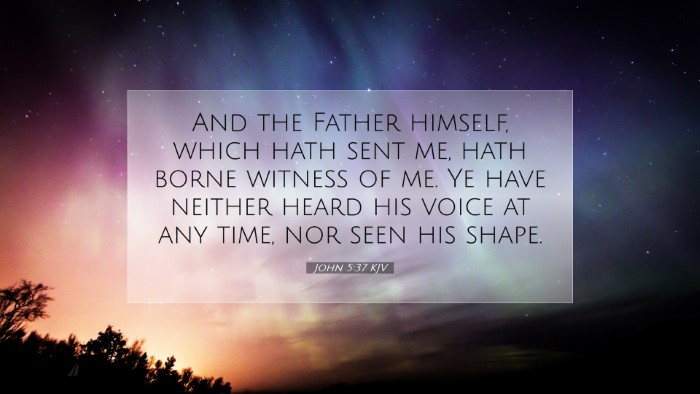Commentary on John 5:37
Verse: "And the Father who sent me has himself testified concerning me. You have never heard his voice nor seen his form." (John 5:37, NIV)
Introduction
John 5:37 serves as a crucial verse within the narrative of the Gospel of John, positioning Jesus as the ultimate revelation of God the Father. In this commentary, we will explore insights from notable public domain commentaries, providing a comprehensive exploration for pastors, students, theologians, and Bible scholars.
Contextual Understanding
This verse is part of a larger discourse wherein Jesus defends His authority. The preceding context emphasizes the miracles He has performed, the testimony of John the Baptist, and the Scriptures that testify about Him (John 5:31-36). By invoking the testimony of the Father, Jesus strengthens His claims as the Messiah.
1. Testimony of the Father
Matthew Henry underscores that the relationship between the Father and the Son is intrinsic to understanding Christ's mission. The "Father who sent me" signifies divine endorsement and the preordained nature of Christ’s ministerial work.
2. Revelation of God
Albert Barnes reflects on the profound implications of the Father’s testimony. He notes that through Christ, the fullness of God’s revelation is manifested, and neglecting this truth leads to spiritual blindness. It highlights the necessity for believers to discern the divine authority behind Jesus' words and works.
3. Spiritual Blindness
Adam Clarke elaborates on the phrase "You have never heard his voice nor seen his form," indicating a spiritual deafness and blindness that prevailed among the Jews at that time. Clarke asserts that this is not merely about physical sight and hearing, but represents a deeper spiritual incapacity to recognize God’s actions and character in Christ.
Implications for Believers
John 5:37 invites an introspective examination of how one perceives and responds to the testimony of God. Below, we outline key implications for modern believers:
- Recognition of Divine Authority: Believers are called to acknowledge the authority of Christ as the ultimate revelation of God.
- Openness to Revelation: Followers of Christ should cultivate receptivity towards God’s voice, ensuring their hearts and minds are aligned with His truth.
- Awareness of Spiritual Condition: This verse prompts a reflection on one's spiritual state and the necessity of divine enlightenment to comprehend God's will.
Theological Reflections
The deeper theological reflection on this passage stresses the interconnectedness of the Father and the Son. Below are significant points derived from the commentaries:
- Trinitarian Understanding: The interaction indicates a complex yet unified relationship within the Trinity—each Person bearing witness to the others’ work.
- Rejection of God's Revelation: The mention of never hearing or seeing suggests a willful rejection; it serves as an admonition for contemporary believers to be vigilant and not dismissive of God’s ongoing revelation.
- Missional Implications: The sending of the Son implies an active mission; believers are tasked with continuing that mission by proclaiming the truths revealed in Christ.
Conclusion
In summary, John 5:37 encapsulates the essence of Christ's divine mission and the testimony that supports it. The insights from Matthew Henry, Albert Barnes, and Adam Clarke weave together a robust theological and practical tapestry that informs and enriches the understanding of this critical passage. As believers engage with this scripture, may they be drawn into a deeper relationship with God, recognizing the necessity of hearing His voice through the ministry of Christ.


